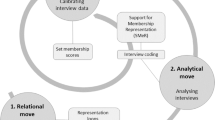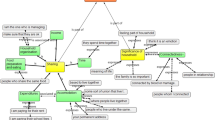Abstract
Because of their close contact with the actual flow of human group life, qualitative research projects frequently have as a bonus the development of insightful concepts of generic quality that catch some essence of social interaction and/or structural conditions. Yet little attention has been paid to the way these concepts are modified and strengthenedover a series of projects. The lack of regard for this methodological issue may lead to the false impression that qualitative research is not cumulative. In this paper, I urge qualitative sociologists to be aware of cumulative concept development as a major methodological tool, and to demonstrate how concepts derived from one research project are extended and modified in subsequent projects. Additionally, I show how this approach aids in both illuminating aspects of a given research context, while at the same time drawing attention to hitherto unnoted relationships among concepts. In this way, more systematic strategies for developing generic concepts and cumulative understanding of human group life through qualitative research is possible.
Similar content being viewed by others
References
Becker, Howard S. 1963Outsiders. New York: The Free Press.
1971Symbolic interactionism. Englewood Cliffs, New Jersey: Prentice-Hall.
1978 Colloquium presented at Sociology Department, University of California, San Diego.
Broadhead, Robert S. 1980 Multiple identities and the process of their articulation: the case of medical students and their private lives.Studies in Symbolic Interaction.3:171–191.
Eckert, J. Kevin 1980The unseen elderly: A study of marginally subsistent hotel dwellers. San Diego: Campanile Press.
Erikson, Robert 1978 Social mooring: An aspect of welfare.International Journal of Contemporary Sociology 15:145–162.
Fine, Gary Alan & Sherryl Kleinman 1979 Rethinking subculture: An interactionist analysis.American Journal of Sociology 85:1–20.
Glaser, Barney G. & Anselm L. Strauss 1967The discovery of grounded theory: Strategies for qualitative research. Chicago: Aldine.
1961Asylums. New York: Anchor Doubleday.
1968 Insanity of place.Psychiatry 32:357–388.
1979 Emotion work, feeling rules and social structure.American Journal of Sociology 85:551–575.
1983The managed heart. Berkeley & Los Angeles: The University of California Press.
Hollander, E. P. 1958 Conformity, status and idiosyncrasy credit.Psychological Review 65:120.
Kitsuse, John 1962 Societal reaction to deviant behavior: Problems of theory and method.Social Problems 9:247–257.
Lemert, Edwin M. 1951Social pathology. New York: McGraw-Hill.
Levine, Donald N. 1971 Introduction in Georg Simmel,On individuality and social forms. (pp. ix-lxv). Chicago: University of Chicago Press.
Levine, Donald N., Ellwood B. Carter, & Eleanor Miller Gorman 1976 Simmel's influence on American sociology: I.American Journal of Sociology 81:813–45.
Libby, Roger 1976 Social scripts for sexual relationships. In S. Gordon and R. Libby (eds.)Sexuality today and tomorrow: Contemporary issues in human sexuality (pp. 172–3). N. Scituate, MA: Duxbury Press.
McGraw, Charles 1961Acting is believing. New York: Holt, Rinehart and Winston.
Maines, David R. 1978 Bodies and selves: Notes on a fundamental dilemma in demography.Studies in Symbolic Interaction 1:241–265.
Mayntz, Renate 1985 Georg Simmel. In Adam Kuper and Jessica Kuper (Eds.),The social science encyclopedia. (pp. 251–257). London: Routledge & Kegan Paul.
Rooney, J. F. 1961 Group processes among skid row winos: re-evaluation of the undersocialization hypothesis.Quarterly Journal of Studies on Alcohol 22:444–460.
Rubington, Earl 1964 Grady “breaks out”: A case study of an alcoholic's relapse.Social Problems 11:372–80.
Schwartz, Pepper, & Judith Long Laws 1977Sexual scripts. Hinsdale, IL: The Dryden Press.
Shibutani, Tamotsu 1961Society and personality. (pp. 323–266). Englewood Cliffs, NJ: Prentice Hall.
Swidler, Ann 1986 Culture in action.American Sociological Review 51:273–286.
Sylvan, David & Barry Glassner 1985A rationalist methodology for the social sciences. Oxford, England: Basil Blackwell.
Thomas, W. I. 1967The unadjusted girl. New York: Harper & Row.
1979aStations of the lost: The treatment of skid row alcoholics. Chicago: University of Chicago Press.
1979b Close encounters of the quasi-primary kind: Sociability in urban second-hand stores.Urban Life 8:23–51.
1985 Individual adjustments and kin relationships in the “new immigration”: An approach to research.International Migration 23:349–368.
1986 The sociology of friendship: Bonds and binds in a voluntary relationship.Journal of Social and Personal Relationships 3:191–211.
(Forthcoming)The other half: Wives of alcoholics. Philadelphia: Temple University Press.
Wolff, Kurt H. 1950The sociology of Georg Simmel. Glencoe, IL: The Free Press.
Author information
Authors and Affiliations
Additional information
An earlier version of this paper was presented at The Conference on Qualitative Research: An Ethnographic/Interactionist Perspective, University of Waterloo, Ontario Canada, May 15–17, 1985. I am grateful to Shulamit Reinharz, Ruth Wallace, Stanley Udy, Raymond Hall, and three anonymous reviewers for their suggestions.
Rights and permissions
About this article
Cite this article
Wiseman, J.P. The development of generic concepts in qualitative research through cumulative application. Qual Sociol 10, 318–338 (1987). https://doi.org/10.1007/BF00988382
Issue Date:
DOI: https://doi.org/10.1007/BF00988382




